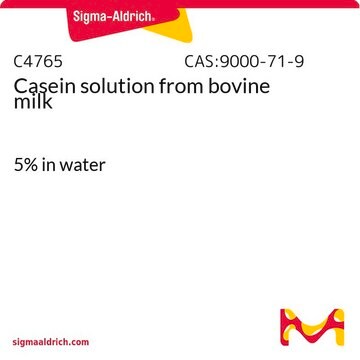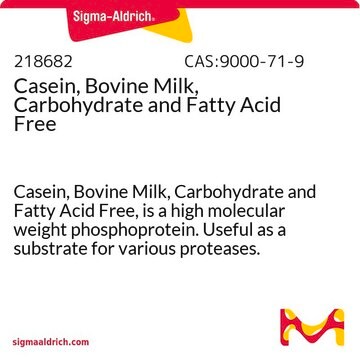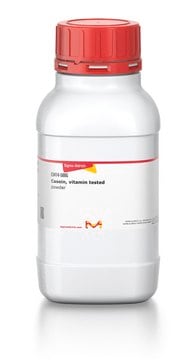C6554
Casein from bovine milk
BioReagent, suitable for insect cell culture
About This Item
Produits recommandés
Source biologique
bovine milk
Gamme de produits
BioReagent
Forme
powder
Technique(s)
cell culture | insect: suitable
Pf
280 °C (dec.) (lit.)
Solubilité
1 M NaOH: 50 mg/mL, turbid, faintly yellow
Température de stockage
room temp
InChI
1S/C81H125N22O39P/c1-36(2)31-50(76(132)94-43(15-24-57(87)108)71(127)101-52(34-64(120)121)78(134)98-49(81(137)138)11-7-8-30-82)99-72(128)47(19-28-61(114)115)95-77(133)51(33-63(118)119)100-73(129)48(20-29-62(116)117)97-80(136)65(37(3)104)103-75(131)44(16-25-58(88)109)92-68(124)42(14-23-56(86)107)90-67(123)41(13-22-55(85)106)91-69(125)45(17-26-59(110)111)93-70(126)46(18-27-60(112)113)96-79(135)53(35-142-143(139,140)141)102-74(130)40(12-21-54(84)105)89-66(122)39(83)32-38-9-5-4-6-10-38/h4-6,9-10,36-37,39-53,65,104H,7-8,11-35,82-83H2,1-3H3,(H2,84,105)(H2,85,106)(H2,86,107)(H2,87,108)(H2,88,109)(H,89,122)(H,90,123)(H,91,125)(H,92,124)(H,93,126)(H,94,132)(H,95,133)(H,96,135)(H,97,136)(H,98,134)(H,99,128)(H,100,129)(H,101,127)(H,102,130)(H,103,131)(H,110,111)(H,112,113)(H,114,115)(H,116,117)(H,118,119)(H,120,121)(H,137,138)(H2,139,140,141)
Clé InChI
BECPQYXYKAMYBN-UHFFFAOYSA-N
Informations sur le gène
bovine ... CSN2(281099) , CSN3(281728)
Vous recherchez des produits similaires ? Visite Guide de comparaison des produits
Actions biochimiques/physiologiques
Code de la classe de stockage
11 - Combustible Solids
Classe de danger pour l'eau (WGK)
WGK 1
Équipement de protection individuelle
Eyeshields, Gloves, type N95 (US)
Certificats d'analyse (COA)
Recherchez un Certificats d'analyse (COA) en saisissant le numéro de lot du produit. Les numéros de lot figurent sur l'étiquette du produit après les mots "Lot" ou "Batch".
Déjà en possession de ce produit ?
Retrouvez la documentation relative aux produits que vous avez récemment achetés dans la Bibliothèque de documents.
Les clients ont également consulté
Notre équipe de scientifiques dispose d'une expérience dans tous les secteurs de la recherche, notamment en sciences de la vie, science des matériaux, synthèse chimique, chromatographie, analyse et dans de nombreux autres domaines..
Contacter notre Service technique















